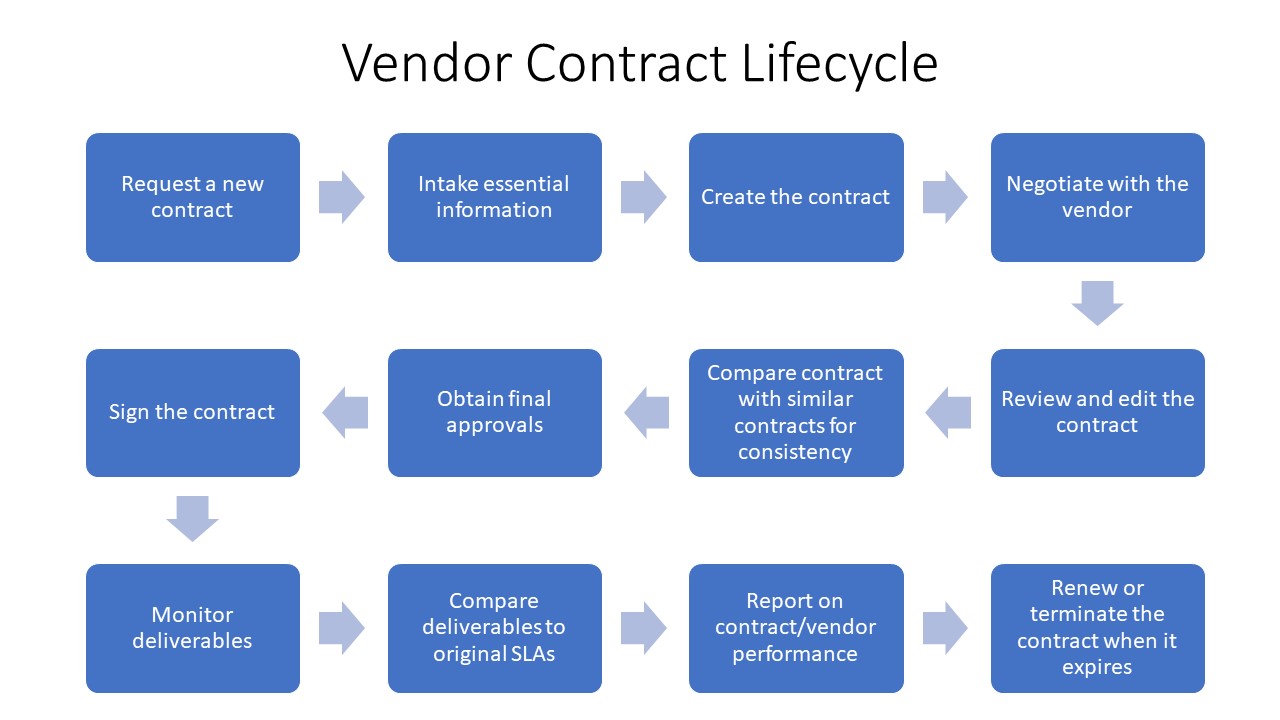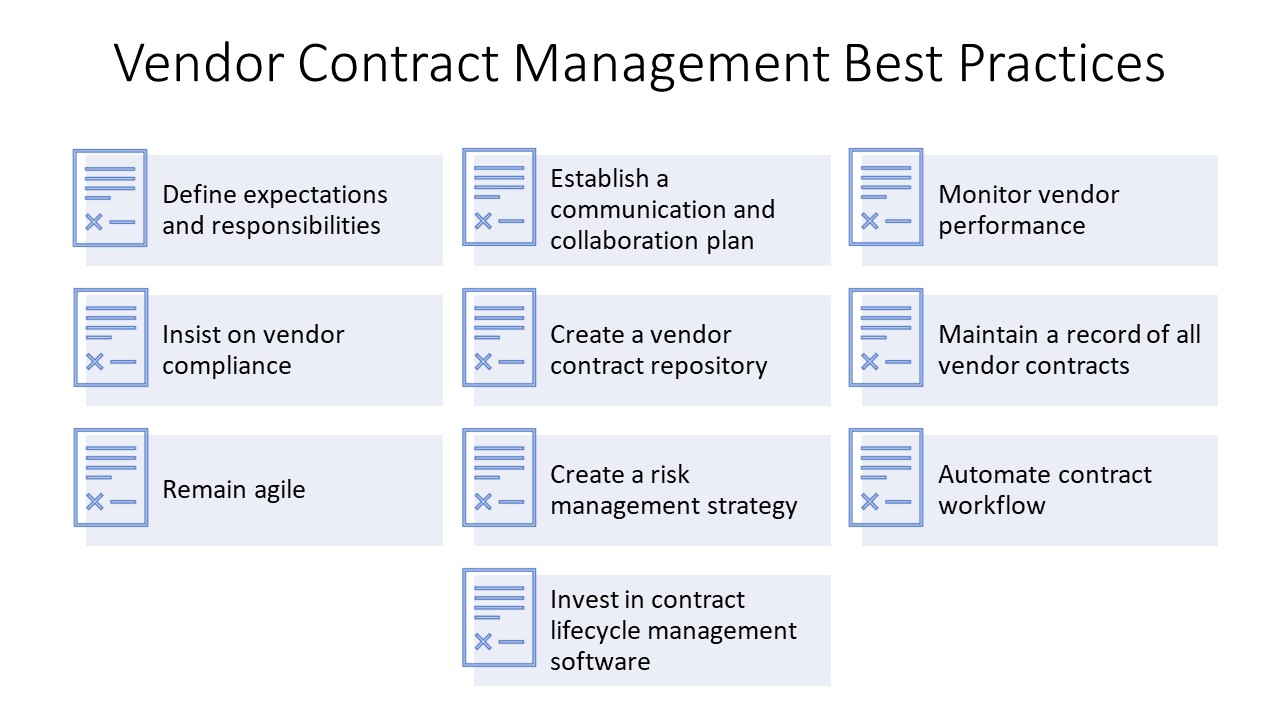The Complete Guide to Vendor Contract Management
May 2nd, 2023
Businesses of all types rely on a network of vendors to provide essential goods and services. Managing all those vendors—and the resulting vendor contract—can be a daunting task. If a vendor doesn’t uphold their end of the contract, your entire operation can suffer.
Staying on top of all your company’s vendors requires meticulous contract management. Effective vendor contract management also ensures that vendors deliver what they’re supposed to and when. It’s all a matter of understanding how vendor contract management works and following the necessary best practices.
Key Takeaways
- Vendor contract management is the practice of overseeing vendor contracts from initiation to fulfillment.
- To more effectively manage vendor contracts, clearly define expectations and responsibilities, establish a communication plan, closely monitor vendor performance, and insist on vendor compliance.
- A single vendor contract repository simplifies the management of all your vendor contracts and obligations.
- It also helps to keep a detailed record of all vendor contracts, remain agile, and create a risk management strategy.
- Embracing contract lifecycle management software helps automate the vendor contract management process.
🤫PS: Discover the 10 best practices for effective contract management HERE.
What is Vendor Contract Management?
Vendor contract management is the practice of overseeing vendor contracts from request and negotiation to execution and fulfillment. This practice not only ensures vendor compliance with contract terms and conditions but also fosters strong relationships between your company and its vendors.
The vendor contract workflow bears similarities to traditional contract workflows, with a few extra steps, including:
- Ensuring consistent contractual terms and service level agreements (SLAs) across similar vendors
- Closely monitoring all deliverables in terms of timing, quality, and pricing
- Comparing deliverables to the original SLAs to ensure vendors are meeting their contractual commitments
- Reporting on vendor performance
10 Best Practices for Vendor Contract Management
A significant portion of most businesses’ operations involve contracts of some sort, particularly with vendors. Effective vendor contract management is essential to any company’s success, and the more vendors you deal with, the more challenging that becomes. Since more than a third of companies today work with more than a thousand different vendors, it’s easy to see the magnitude of the challenge.
Effective vendor contract management requires learning how to be a tough but fair negotiator, knowing when to walk away from a deal, and having backup plans in place in case a vendor doesn’t deliver. In addition, implementing the following 10 best practices can help you execute the most favorable contracts and maximize contract compliance.
1. Clearly Define Expectations and Responsibilities
To best manage your vendors and vendor contracts, you need to clearly set out your expectations for each vendor and contract. This includes outlining both the vendor’s and your responsibilities—who is responsible for what and when, as well as the consequences of unmet responsibilities. These expectations and responsibilities should be defined within the contract to avoid ambiguity.
2. Establish a Vendor Communication and Collaboration Plan
Successful vendor relationship is a two-way street and requires ongoing contact and feedback to ensure everything goes smoothly.
To promote clear and consistent communication, develop a communication and collaboration plan and define it contractually. This plan should spell out how the two parties should communicate (via email, phone, Microsoft Teams, etc.), the key contacts for both firms, and the frequency of communication. To this last point, it’s a good idea to establish a regular communication schedule with major vendors, typically in the form of a weekly or monthly update call or meeting. This obligates both of your companies to continuously check in with each other—which helps to maintain a strong relationship with that vendor.
3. Closely Monitor Vendor Performance
Communication alone doesn’t guarantee a vendor’s contract compliance. You need to closely monitor all deliverables and obligations to ensure the vendor is performing as promised. You can’t rely on the vendor’s word and good nature. You need to track the vendor’s compliance with all the terms of the contract. This includes making sure all deliveries are made as scheduled, evaluating product quality, and double-checking pricing to make sure you’re not overbilled. It’s not that you can’t trust your vendors, but you need to check up on them regularly.
4. Insist on Vendor Compliance
If you identify vendor compliance issues, immediately bring them to the vendor’s attention. A good vendor will promptly react and rectify any problems. If a vendor is slow to react, you need to insist on better performance, enacting any contractual penalties for noncompliance. Hold your vendors accountable for their promises. Staying on top of your vendors, including conducting periodic performance reviews, should result in better vendor performance.
5. Create a Single Vendor Contract Repository
It’s difficult to track contract performance if your contracts are scattered throughout your organization. The best practice is to centralize all your vendor contracts in a single digital repository. This lets you more easily keep track of your contracts and deliverable dates. It’s difficult to hold a vendor responsible if you don’t know when an obligation is due.
6. Maintain a Detailed Record of all Vendor Contracts
The more contracts you manage the more challenging it is to manage them. For this reason, you need to keep a master record of all your live contracts and agreements. This record should include all key contract details—deliverables, pricing, renewal/expiration dates, and the like. It’s relatively easy to generate such a master list from a centralized electronic database—in fact, this is something contract lifecycle management software can do with just a few clicks. You want to regularly update this master record to ensure you have the most current data.
7. Remain Agile
In the world of vendor contracts, unexpected things happen. You need to develop the facility to act and react quickly when vendors miss deadlines or changing market conditions force operational changes. Agility is a necessity.
8. Create a Risk Management Strategy—Just In Case
You can be more agile if you have a plan for dealing with potential issues if they arise. You need to know what you’ll do if a vendor doesn’t deliver as promised. You need to have a backup plan with alternative suppliers and operational modifications. This risk management strategy should apply across all your contracts but have specific provisions for individual vendors.
9. Automate the Contract Workflow
Many contract issues stem from internal rather than external factors. Automating your contract workflow can ensure that contracts don’t get lost or overlooked by responsible parties. The more you automate formerly manual processes, the less human error will creep into the flow.
10. Invest in Contract Lifecycle Management Software
The final best practice helps to implement many of the previous practices. Contract lifecycle management (CLM) software automates many of the things you need to do to manage your vendor contracts effectively. Instead of trying to manage all your vendor contracts manually, let a CLM solution do the work for you.
Streamline Your Vendor Contract Management with Contract Logix
For effective vendor contract management, turn to the contract experts at Contract Logix. Our CLM solutions include everything you need for improved vendor contract management, including a centralized digital contract repository, detailed obligation tracking and notifications, in-depth reporting and analysis, and automated contract workflow. Vendor contract management is made easier with Contract Logix.
Contact Contract Logix to learn more about vendor contract management.
Looking for more articles about Contract Management? Check out our previous article “3 Ways to Ace Contract Negotiation in Any Scenario“.
Accelerate Your Digital Transformation With Contract Logix
Download our Data Extraction Product Brief to learn how you can automate the hard work using artificial intelligence




